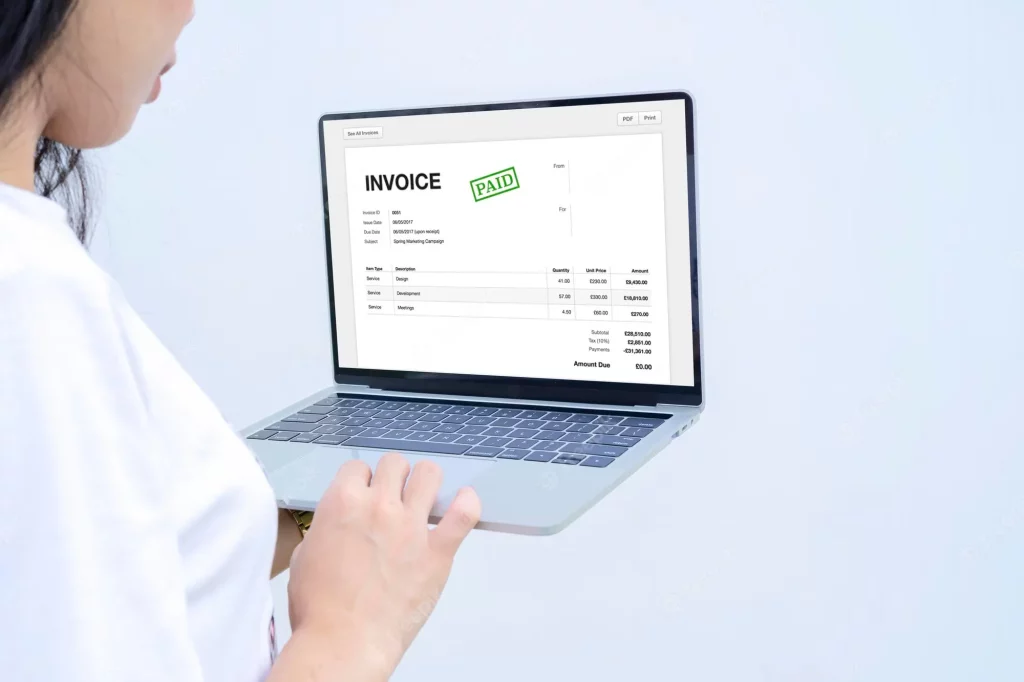In the ever-evolving landscape of small business management, accounting software has become an indispensable tool. As we step into 2023, it’s crucial for small businesses to have efficient and reliable accounting software to streamline financial operations. In this article, we’ll explore the best accounting software options tailored to the needs of small businesses, highlighting their features and benefits.

10 Best Accounting Software for Small Businesses in 2023
For small businesses and freelancers to succeed, maintaining strict control over funds is essential. To help you keep your business profitable, we’ve reviewed the finest accounting software for small businesses.
1. QuickBooks Online
QuickBooks Online remains a stalwart in the world of accounting software for small businesses. Its user-friendly interface and robust set of features make it an ideal choice for startups and established enterprises alike.
Key Features:
Get TikTok SEO Cheat here
- Invoicing and expense tracking
- Bank reconciliation
- Payroll processing
- Inventory management
- Integration with various third-party apps
- Comprehensive financial reporting
QuickBooks Online offers different pricing tiers to accommodate various business sizes and needs. It’s an excellent choice for businesses looking for a versatile accounting solution.
2. Xero
Xero is another cloud-based accounting software that’s gaining popularity among small business owners. It offers a sleek and intuitive interface, making it easy for non-accountants to manage their finances effectively.
Key Features:
- Online invoicing and bill management
- Bank reconciliation
- Payroll processing
- Inventory tracking
- Integration with 800+ third-party apps
- Real-time collaboration with advisors
Xero’s pricing structure is flexible, and it offers a 30-day free trial, making it an attractive option for small businesses wanting to explore its capabilities.
3. FreshBooks
FreshBooks is designed with simplicity in mind, making it an excellent choice for freelancers and small service-based businesses. It’s known for its user-friendly interface and exceptional invoicing features.
Key Features:
- Time tracking and project management
- Client management
- Expense tracking
- Customizable invoices
- Integration with popular payment gateways
- Detailed financial reports
FreshBooks offers a free trial and various pricing plans to suit the needs of small businesses, making it a top choice for those who value ease of use.
4. Zoho Books
Zoho Books is an affordable accounting software solution that caters to small businesses and freelancers. It offers a wide range of features while remaining budget-friendly.
Key Features:
- Invoicing and expense tracking
- Bank reconciliation
- Inventory management
- Collaboration tools
- Tax management
- Integration with other Zoho apps
Zoho Books provides value for money and is an excellent choice for cost-conscious small businesses looking for a capable accounting tool.
5. Wave
Wave is unique in that it offers accounting software with no monthly subscription fees. It’s a great choice for extremely small businesses and startups with limited budgets.
Key Features:
- Invoicing and receipt scanning
- Expense tracking
- Bank reconciliation
- Simple, no-cost payroll
- Basic financial reports
- Unlimited user access
While it lacks some of the advanced features of paid options, Wave is a fantastic starting point for businesses just getting off the ground.
6. Sage 50cloud
Sage 50cloud is a hybrid accounting solution that combines desktop software with cloud capabilities. It’s well-suited for businesses that prefer the security of desktop software but want the flexibility of cloud access.
Key Features:
- In-depth financial management
- Inventory tracking
- Vendor and customer management
- Payroll processing
- Cloud backup and mobile access
- Robust reporting
Sage 50cloud offers multiple pricing plans, making it adaptable to businesses of various sizes and industries.
7. QuickBooks Desktop
For businesses that prefer traditional desktop software, QuickBooks Desktop remains a powerful option. It offers robust features and is known for its reliability.
Key Features:
- Advanced financial management
- Inventory tracking
- Payroll processing
- Extensive reporting options
- Multiple user access
- Integration with QuickBooks Payments
QuickBooks Desktop is an excellent choice for businesses that need the power of desktop software with the option to access data in the cloud.
8. NetSuite
NetSuite is a comprehensive cloud-based ERP system that includes accounting features. It’s ideal for small businesses with complex needs and a focus on scalability.
Key Features:
- Financial management
- CRM and e-commerce integration
- Inventory and supply chain management
- Advanced analytics
- Multi-currency support
- Customization options
NetSuite may be a bit more complex than other options but offers extensive capabilities for growing small businesses.
9. Wave Financial
Wave Financial (not to be confused with Wave mentioned earlier) is a free accounting software designed for small businesses and freelancers. It provides essential features at no cost.
Key Features:
- Invoicing and receipt scanning
- Expense tracking
- Bank reconciliation
- Basic financial reports
- Unlimited user access
- Free forever with optional paid add-ons
Wave Financial is a budget-friendly choice for businesses with limited financial management needs.
10. OneUp
OneUp is a cloud-based accounting software that offers a range of features for small businesses, including invoicing, expense tracking, and inventory management.
Key Features:
- Invoicing and expense tracking
- Bank reconciliation
- Inventory management
- Collaboration tools
- Multi-currency support
- Integration with e-commerce platforms
OneUp’s pricing is competitive, and it’s suitable for small businesses looking for a versatile accounting solution.

Conclusion
In 2023, the best accounting software for small businesses is all about flexibility, ease of use, and affordability. The options mentioned in this article offer a range of features to suit different business needs and budgets. To choose the right accounting software for your small business, consider your specific requirements, budget constraints, and plans for growth. With the right accounting software in place, you can efficiently manage your finances, reduce errors, and focus on what truly matters: growing your business.